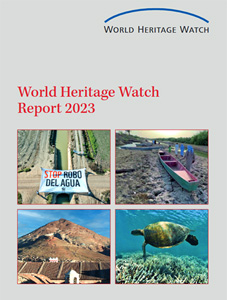Current issues
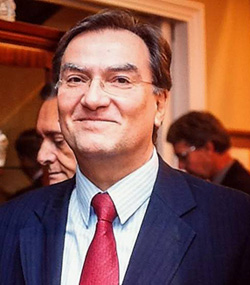
Dr. Michael Worbs 1950 – 2023
Obituary

Press Release / Pressemitteilung
UNESCO’s World Heritage Committee Postpones its Session in Russia
UNESCO-Welterbekomitee vertagt seine Sitzung in Russland
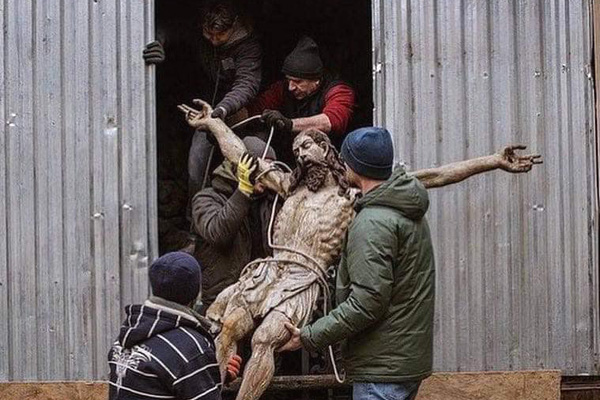
Call for Donations
Ukrainian Museums and Churches are in dire need to bring their cultural heritage to safety from Russian shelling.
Read More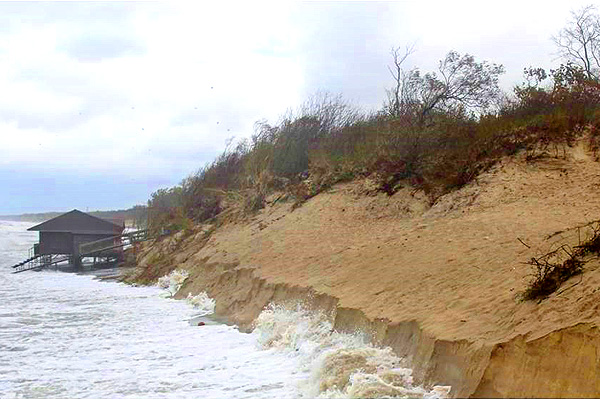
Archive
The UNESCO World Heritage System is Dysfunctional Das UNESCO-Welterbesystem ist dysfunktional
Eine Bilanz der Sitzung des UNESCO-Welterbekomitees 2023 in Riad Berlin, 25. September 2023.
Das System der UNESCO zur Nominierung, Überwachung und Erhaltung von Welterbestätten kann seine Aufgabe nicht mehr hinreichend erfüllen. Diese besorgniserregende Bilanz zieht World Heritage Watch nach der soeben zuende gegangenen zweiwöchigen Sitzung des Welterbekomitees – des periodisch gewählten Gremiums von 21 Staaten, das im Auftrag der Staatengemeinschaft alle Entscheidungen über das Welterbe trifft.
World Heritage Watch Report 2023: Serious Earthquake Damages to World Heritage Sites
Organization presents first full documentation among 45 reports on World Heritage sites
Berlin, 2 June 2023
In a new report, World Heritage Watch, the global network monitoring UNESCO’s World Heritage sites, has published a first documentation and preliminary assessment of damages to four World Heritage sites in Turkiye and Syria from the devastating earthquake that hit the region in February.
The four sites affected are Diyarbakir with its massive city and fortress walls in Turkish Kurdistan, as well as three sites in Syria: the historic city of Aleppo, the “Ancient Cities of Northern Syria” in its battered Idlib Governorate, and the two medieval castles of Crac des Chevaliers and Qal’at Salah El-Din, further south.
“Aleppo has been hit most severely while the damages in the other sites are widespread but less heavy, although some buildings need urgent stabilization. Many buildings in Aleppo which were destroyed in the war have not been restored according to standard, and these are affected worst by the earthquake,” explains Stephan Doempke, chair of World Heritage Watch and the editor of the Report. “The situation in Syria is compounded by the fact that international public organizations cannot work in the country due to the sanctions imposed on the Assad regime.”
The reports were compiled by local NGOs and activist experts immediately after the earthquake, but one official report by Syria’s Directorate-General for Antiquities and Museums was included, too.
The documentation comes as a Special Reports section of the organization’s WHW Report 2023 which includes another 45 World Heritage sites around the world threatened by overtourism, climate change, or outright destruction by government projects.
“Some places are being destroyed as we speak”, says Doempke. “They need urgent intervention, and we are wondering why some of them are not even on the agenda of the World Heritage Committee this year. UNESCO is caught up in procedures and political lobbyism. It urgently needs an efficient rapid response mechanism.”
Urgent cases where the Committee should step in immediately are the ongoing eviction of the indigenous Maasai from Tanzania’s Ngorongoro Conservation Area, the disfigurement of the Acropolis of Athens, the crumbling mining mountain near Potosí in Bolivia, the drying up of Spain’s Doñana National Park, and the plan to destroy the oldest archaeological site of St. Petersburg for a business complex – all covered in the WHW Report.
In Historic Cairo, where the arguably most important necropolis of the Islamic world is being bulldozed to make way for a freeway system, dozens of Egyptian intellectuals, frustrated by UNESCO’s inactivity, have directly addressed the presiding country of the World Heritage Committee, Saudi Arabia, requesting them, as the guardian of Islam, to save what is left of the necropolis.
Destruction is happening so fast that it was not even possible to write a report about the situation.
The World Heritage Watch Report is not based on a comprehensive survey of all World Heritage sites. Rather it contains those reports which have been submitted by civil society actors around the world, based on intricate knowledge of conditions on the ground as well as national politics.
The full World Heritage Watch Report 2023, as well as some photos, can be downloaded from https://world-heritage-watch.org/content/world-heritage-watch-report-2023
Downloads
The Potsdam Papers
A Reform Agenda for the World Heritage Convention
Unterschriftenkampagne Goslar
Goslarer Initiative wendet sich gegen die Verunstaltung des Marktplatzes
World Heritage Watch Report 2023: Serious Earthquake Damages to World Heritage Sites
Organization presents first full documentation among 45 reports on World Heritage sites
Berlin, 2 June 2023
In a new report, World Heritage Watch, the global network monitoring UNESCO’s World Heritage sites, has published a first documentation and preliminary assessment of damages to four World Heritage sites in Turkiye and Syria from the devastating earthquake that hit the region in February.
The four sites affected are Diyarbakir with its massive city and fortress walls in Turkish Kurdistan, as well as three sites in Syria: the historic city of Aleppo, the “Ancient Cities of Northern Syria” in its battered Idlib Governorate, and the two medieval castles of Crac des Chevaliers and Qal’at Salah El-Din, further south.
“Aleppo has been hit most severely while the damages in the other sites are widespread but less heavy, although some buildings need urgent stabilization. Many buildings in Aleppo which were destroyed in the war have not been restored according to standard, and these are affected worst by the earthquake,” explains Stephan Doempke, chair of World Heritage Watch and the editor of the Report. “The situation in Syria is compounded by the fact that international public organizations cannot work in the country due to the sanctions imposed on the Assad regime.”
The reports were compiled by local NGOs and activist experts immediately after the earthquake, but one official report by Syria’s Directorate-General for Antiquities and Museums was included, too.
The documentation comes as a Special Reports section of the organization’s WHW Report 2023 which includes another 45 World Heritage sites around the world threatened by overtourism, climate change, or outright destruction by government projects.
“Some places are being destroyed as we speak”, says Doempke. “They need urgent intervention, and we are wondering why some of them are not even on the agenda of the World Heritage Committee this year. UNESCO is caught up in procedures and political lobbyism. It urgently needs an efficient rapid response mechanism.”
Urgent cases where the Committee should step in immediately are the ongoing eviction of the indigenous Maasai from Tanzania’s Ngorongoro Conservation Area, the disfigurement of the Acropolis of Athens, the crumbling mining mountain near Potosí in Bolivia, the drying up of Spain’s Doñana National Park, and the plan to destroy the oldest archaeological site of St. Petersburg for a business complex – all covered in the WHW Report.
In Historic Cairo, where the arguably most important necropolis of the Islamic world is being bulldozed to make way for a freeway system, dozens of Egyptian intellectuals, frustrated by UNESCO’s inactivity, have directly addressed the presiding country of the World Heritage Committee, Saudi Arabia, requesting them, as the guardian of Islam, to save what is left of the necropolis.
Destruction is happening so fast that it was not even possible to write a report about the situation.
The World Heritage Watch Report is not based on a comprehensive survey of all World Heritage sites. Rather it contains those reports which have been submitted by civil society actors around the world, based on intricate knowledge of conditions on the ground as well as national politics.
The full World Heritage Watch Report 2023, as well as some photos, can be downloaded from https://world-heritage-watch.org/content/world-heritage-watch-report-2023
Downloads
Resignation from World Heritage Committee Shows Russian Isolation
World Heritage Watch welcomes the resignation of Russia's ambassador to UNESCO from the presidency of the World Heritage Committee. It proves that Russia is increasingly isolated in the international community. A state that deliberately destroys hundreds of cultural monuments in its neighboring country and plunders its museums in order to annihilate its national identity cannot be tolerated in a UNESCO body.
We now call on the countries of the democratic camp in the World Heritage Committee, such as Italy and Japan, to apply for the presidency and thus the chairmanship at the next session of the World Heritage Committee. If this continues to be left to authoritarian states, we should not be surprised if the World Heritage becomes a political pawn and UNESCO loses its credibility.
The new presidency must now take decisive steps toward a comprehensive reform of the World Heritage Convention, involving civil society. This includes not only amending the Rules of Procedure so that belligerent states can be deprived of the presidency, but above all counteracting the inflation of the World Heritage List, focusing instead on the preservation of sites already inscribed and also providing the necessary funding for this purpose. In its recently published Potsdam Papers, World Heritage Watch has made concrete and actionable proposals that need to be tabled by the World Heritage Committee.
Contact: Stephan Doempke contact@world-heritage--watch.org +49 151 1167-4691
Acropolis – Plea against interventions
The Acropolis of Athens, one of the most perfect edifices human genius has ever built, and a World Heritage Site, is being disfigured by the massive use of reinforced concrete.
> read more
High Court Judgement AGAINST A303 Stonehenge scheme!
Save Stonehenge World Heritage Site Ltd., the legal representative of the Stonehenge Alliance issued this press release on Friday 30 July:
Save Stonehenge World Heritage Site is delighted the High Court has today held that Transport Secretary Grant Shapps acted unlawfully when granting permission for a dual carriageway and short tunnel through the Stonehenge World Heritage Site (WHS).
The World Heritage is on a Dangerous Path
A critical review of the 44th Session of the World Heritage Committee by WHW Chair Stephan Doempke
Food Shortage in a Pacific Islands World Heritage Site! Please help the People of East Rennell!
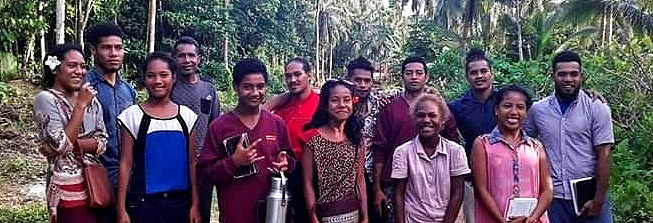
When the eastern half of the island of Rennell was inscribed in the World Heritage List in 1998, the local community was in full support, hoping that their lives would change for the better through tourism and investments. They were wrong. Both the international community and their own government have turned their back on them, and it has come to the point that they suffer food shortages. Now they are warning that they will start logging their forest – one of the most pristine in all the small Pacific Islands – and give up on the World Heritage status which hasn’t brought them any benefit in more than 20 years.
The islanders need fishing gear and seedlings of fruit trees in order to provide for their own food. When all UNESCO member states don’t care to help East Rennell, we will not stand idly by.
Please make your generous donation, earmarked “East Rennell” here.
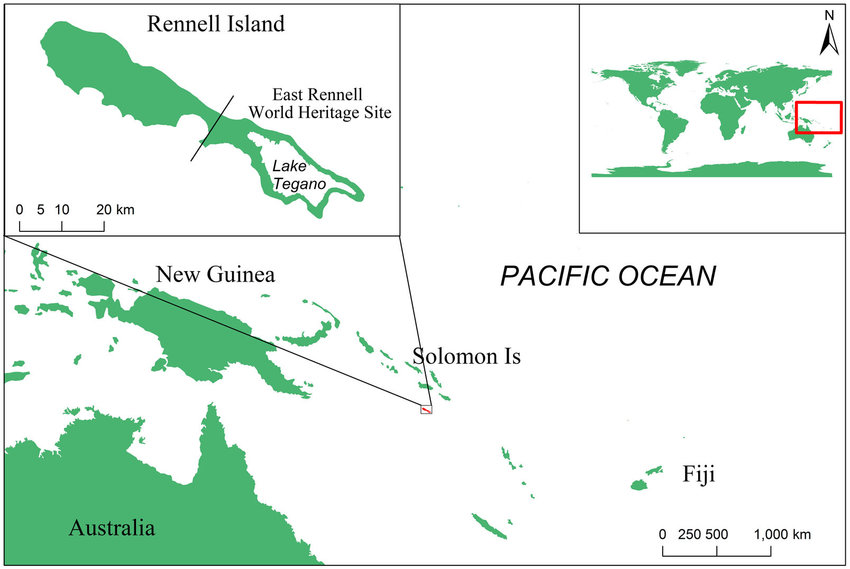
Rennell is the southernmost island of the Solomon Islands in the western Pacific. It is the largest raised coral atoll in the world. A major feature of the island is Lake Tegano, which was the lagune of the atoll before the island rose up from the ocean due to geological activity. Rennell is still covered with dense tropical forest averaging 20m in height and providing habitat for a multitude of rare and endemic birds and plants. Its population of 1,800 is an ethnic Polynesian minority in the mostly Melanesian Solomon Islands.
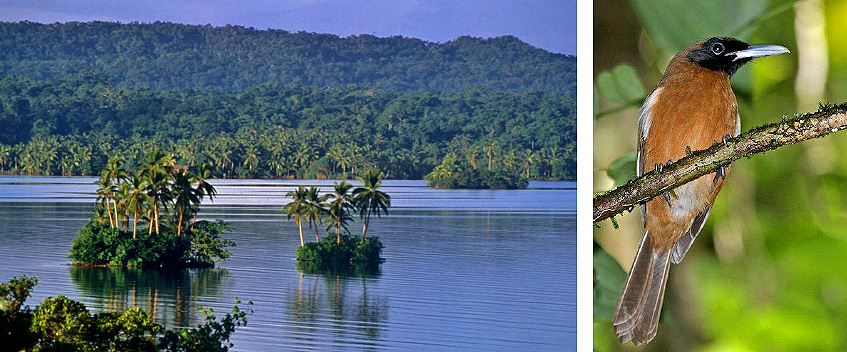
The local communities of East Rennell have been congratulated for their commitment to protect the World Heritage site. However, bauxite mining is now widespread in the western part of the island, which has led to an invasion of rats who devastate fields and crops. Logging has been approved within 200 m of the World Heritage boundary leading to a loss of groundwater. At the same time, Lake Tegano is threatened by sea level rise and increased salinity, and as a result, it has become impossible for the community to grow taro, their staple food which is also of great cultural importance.
The International Union for the Conservation of Nature (IUCN) – the body advising UNESCO – has stated in its recent report:
“The real long-term threat to the … site is the lack of alternative income generating alternatives to commercial logging and mining … Additional support for sustainable livelihoods should urgently be provided to communities to ensure protection and management of the site.”
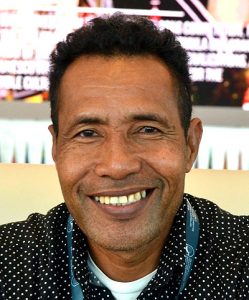 We are in close contact with Jorge Tauika, the leader of the local community’s Lake Tegano World Heritage Site Association, a registered charity which will be the recipient of our support. Jorge has been invited by UNESCO before and enjoys high trust and respect of both the local and international community.
We are in close contact with Jorge Tauika, the leader of the local community’s Lake Tegano World Heritage Site Association, a registered charity which will be the recipient of our support. Jorge has been invited by UNESCO before and enjoys high trust and respect of both the local and international community.
With your support, he can go to the capital, Honiara, in order to buy the fishing equipment and seedlings so urgently needed to keep his people healthy and the World Heritage safe.
Please make your generous donation, earmarked “East Rennell” above.
Thank you for your support!
Sincerely,
Stephan Doempke
Chairman and CEO, World Heritage Watch
World Heritage Watch Statement on Hagia Sophia
The Hagia Sophia is widely considered to be one of the most important buildings in the history of architecture as well as the history of religions, and indeed of world history at large. It was the last monumental building of antiquity and the biggest building of the world at its time.
> read complete Statement
Lockdown is a Much-Needed Opportunity to Rethink World Heritage Tourism
PRESS RELEASE
on the occasion of World Environment Day
EMBARGOED UNTIL FRIDAY, 5 June 11:00 a.m. CEST
Lockdown is a Much-Needed Opportunity to Rethink World Heritage Tourism
World Heritage Watch Report 2020 alerts to tourism as an increasing threat to the world heritage
Tourism is becoming an increasing factor of threat to UNESCO's World Heritage, and promoting tourism, not protecting the site, is often the motivation for seeking inscription in the World Heritage List. The German NGO World Heritage Watch, which coordinates a network of about 170 civil society groups around the globe, is calling to use the global collapse of tourism caused by the Covid-19 pandemic as an opportunity to rethink the role of tourism in world heritage sites.
Visiting the sites is expressly encouraged, but there is a risk that World Heritage status will morph from an instrument of protection to a factor of threat. This is indicated by the World Heritage Watch Report 2020 which has been released today. In a full third of all cases included in the report, tourism development is the direct or indirect reason that the site could end up on UNESCO's World Heritage Sites in Danger List.
World Heritage Watch calls on UNESCO to adopt strict and binding criteria for sustainable tourism at World Heritage Sites, and to make them a condition for new inscriptions on the World Heritage List. Education, encounters with the local population, and the experience of heritage as something held in common must not be given up. Local communities must be empowered to perform with dignity their role as guardians of the sites and to convey the intangible heritage associated with them.
Until the Covid-19 pandemic, World Heritage sites were particularly affected by the excesses of overtourism because they are preferred tourist destinations due to their importance and attractiveness. Tourist numbers skyrocketed as soon as a site was inscribed in the World Heritage List, and the large numbers of visitors quickly collided with the particularly strong protection requirements of the World Heritage sites.
The phenomenon no more affects only well-known places such as Venice, Machu Picchu or the Taj Mahal, but also remote ones such as Lake Ohrid in Northern Macedonia, Hampi in India, or the Kamtchatka peninsula of Eastern Siberia.
Berlin, 3 June 2020
World Heritage Watch Report 2020 alerts to tourism and mining as increasing threats to the world heritage
PRESS RELEASE
on the occasion of World Environment Day
EMBARGOED UNTIL FRIDAY, 5 JUNE 11:00 a.m. CEST
World Heritage Watch Report 2020 alerts to tourism and mining as increasing threats to the world heritage
Mining remains a major threat to UNESCO's World Heritage sites but is increasingly joined by tourism, according to a new report issued by World Heritage Watch, a global network of more than 170 NGOs, indigenous peoples and civil society activists who monitor sites on the ground.
While some sites in Siberia such as the Forests of Komi and the Altai Mountains have been of concern for years, new plans for uranium mining have been reported near the Grand Canyon and in southern Greenland, and a Venezuelan activist group has uncovered devastating gold mining in Canaima National Park, one of the world's gems for biodiversity and harbouring Angel Falls, the worlds highest. Although UNESCO has a No-Go-Policy in place for mining in World Heritage sites, this is often ignored or evaded by its member states following their perceived national interest.
Meanwhile, tourism has grown to an extent that it is becoming an increasing factor of threat to UNESCO's World Heritage, and often promoting tourism, not protecting the site, is now the motivation for seeking inscription in the World Heritage List. While visiting the sites is expressly encouraged, there is a risk that World Heritage status will morph from an instrument of protection to a factor of threat.
Until the Covid-19 pandemic, World Heritage sites were particularly affected by the excesses of overtourism because they are preferred tourist destinations due to their importance and attractiveness. Tourist numbers skyrocketed as soon as sites were inscribed in the World Heritage List, and the large numbers of visitors quickly collided with the particularly strong protection requirements of the World Heritage sites. The phenomenon no more affects only well-known places such as Venice and Machu Picchu but also remote ones such as Lake Ohrid in Northern Macedonia and Hampi in India. The advocacy network now calls for using the worldwide standstill in tourism to rethink this development, and requests UNESCO to adopt strict guidelines for tourism planning before new sites are inscribed in its prestigious list.
World Heritage Watch provides information to UNESCO unreported by its member states in order to help the agency having a more comprehensive assessment of the real situation at the sites under its tutelage, and take more appropriate decisions to eliminate threats. Since its founding in 2014 it has earned a reputation with UNESCO to be the global voice of civil society in World Heritage matters.
Berlin, 4 June 2020
Donate for the guardians of World Heritage in Libya!
18.04.2019
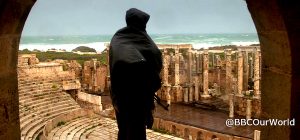 Today on International World Heritage Day we want to express our gratitude to the fire fighters of Notre Dame who risked their lives in order to save a priceless heritage for all of us. At the same time we would remind that there are hundreds and thousands of people around the world who give everything they have to protect and safeguard World Heritage sites at their places and who very seldom receive a word of gratitude or other support. We want to thank them all - the activists who protest against neglect and deliberate destruction, the rangers at national parks who shield wildlife from poachers with their own bodies, the private owners whose pride it is to give an example of heritage protection, and the uncounted citizens who volunteer to maintain places and whose small donations mean more of a sacrifice to them than big amounts to many others.
Today on International World Heritage Day we want to express our gratitude to the fire fighters of Notre Dame who risked their lives in order to save a priceless heritage for all of us. At the same time we would remind that there are hundreds and thousands of people around the world who give everything they have to protect and safeguard World Heritage sites at their places and who very seldom receive a word of gratitude or other support. We want to thank them all - the activists who protest against neglect and deliberate destruction, the rangers at national parks who shield wildlife from poachers with their own bodies, the private owners whose pride it is to give an example of heritage protection, and the uncounted citizens who volunteer to maintain places and whose small donations mean more of a sacrifice to them than big amounts to many others.
As civil war is intensifying in Libya, more World Heritage sites may get lost forever. Please support the brave men and women in the neighbourhood of Libyan World Heritage sites who guard those sites from being pillaged and destroyed by invading militias. They risk their lives as much as the fire fighters of Notre Dame, and they deserve to be recognized as much.
Please donate through www.world-heritage-watch.org or in the US through our fiscal sponsor www.globalheritagefund.org, earmark "Libya".
Introducing Rod Prosser
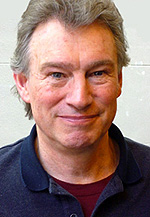 We are happy to introduce Rod Prosser, our representative for the Australia-Pacific Region. He will support us in promoting World Heritage Watch, extending the network, and fundraising. Over time we hope to find more committed individuals who will assume that responsibility in other parts of the world as well.
We are happy to introduce Rod Prosser, our representative for the Australia-Pacific Region. He will support us in promoting World Heritage Watch, extending the network, and fundraising. Over time we hope to find more committed individuals who will assume that responsibility in other parts of the world as well.
Rod is a New Zealand film-maker who has been making political documentaries since the 1970s. His New Zealand themes have included Maori sovereignty, environmental education, workers rights and the anti-nuclear movement. While living in Berlin in the 1990s, he made a number of documentaries for German television including films about the interdependent struggles for the environment, indigenous cultures and revolution in the Philippines, the history and culture of Rapanui/Easter Island, and American militarism in the Pacific. For most of his life, Rod has also been involved in solidarity work with peoples of the Third World (especially the Philippines) and has worked with NGOs in NZ and in Germany to support indigenous peoples, biosphere reserves and environmental activism.
Contact Rod Prosser through orodi@protonmail.com

